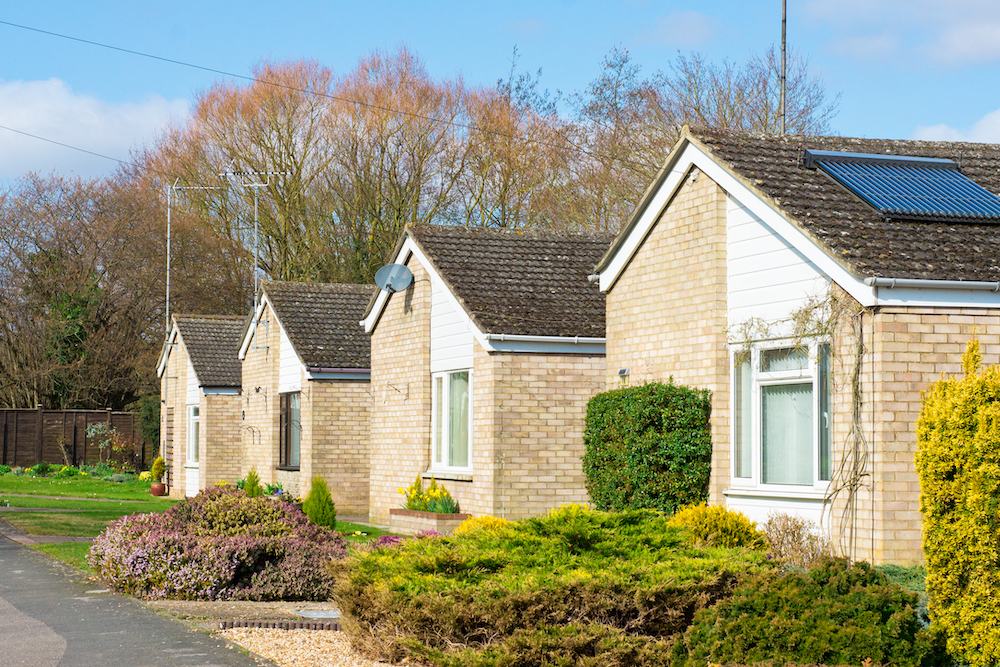
by Kim Pidgeon | May 12, 2023 | News
Planning permission granted for 102 social rent flats
Ealing Council has given the go ahead for a new women’s-only social housing tower block in the borough, close to Acton Town Underground station.
The 15-storey tower will replace the existing 1930s building, Brook House, located on Gunnersbury Lane. The original estate, which also included additional blocks made in the 1970s, is not suitable for refurbishment.
The approved plans will replace the existing buildings and 39 homes on site to create 102 social rent affordable flats for single women, particularly those who face inequality, abuse and disadvantages, especially in the housing market.
The application is supported by Women’s Pioneer Housing (WPH), who are only one of two such specialised housing associations in the country, and L&Q, one of the largest social housing provider in the UK.
The proposed new women’s-only flats, which will be for new tenants as well as existing ones wishing to return, will have dual aspect and a balcony. Works are expected to start on site this summer, with the design also including a range of recreational spaces for residents.
Women’s Pioneer Housing work closely with women’s refuges, homelessness agencies and women’s organisations to provide long-term safe, secure and affordable homes for women.
The organisation says the Brook House project comes amid rising levels of inequality for women in the UK, particularly those who are older, have a disability or are BAME women. Adding there is a huge existing demand for this type of housing; in Ealing alone there are over 600 single women on the social housing waiting list.
The scheme is brought forward with support from L&Q, through their initiative Build London Partnership (BLP), which seeks to find a tailored solution to London’s housing crisis.
Through the BLP, L&Q partners with smaller or specialised housing associations to work in collaboration to develop small, disused, infill and challenging sites across the capital.
WPH says this ‘helps unlock key sites in London and deliver much needed affordable and social housing, often for hard-to-reach communities’.

by Kim Pidgeon | Apr 28, 2023 | News
Social housing providers and local councils join forces to demand salary transparency
G15 members along with other leading housing associations and local councils are launching The ‘Big Six’ employer’s pledge, which requires contractors to advertise salary details in all adverts.
The ‘Big Six’ initiative is part of Social Value Week – organised by the Social Value Leadership Group (SVLG), a forum for social value leads within UK housing associations and local councils.
Combined the G15 members, other not-for-profit housing associations and local councils are responsible for around 1.2 million homes and this is part of efforts to raise job standards through their supply chains.
Around four in ten job adverts do not provide pay information [1], something that experts have reported contributes to gender and ethnicity gaps.
Research by The Fawcett Society has found that job adverts which don’t list a salary range often mean candidates are asked their salary history when negotiating pay, with 58 per cent of women feeling they had received a lower salary offer after having to disclose their previous earnings [2].
The ‘Big Six’ employer’s pledge also guarantees all jobs pay at least the National Minimum Wage or National Living Wage, alongside commitments that training is linked to qualifications or a specific job.
Feedback to all unsuccessful candidates will be mandated by providers, and contractors will need to show how they are offering pre-employment and in-work support for career progression, alongside offering work experience and work trials for roles where possible.
The pledge is part of a collective response from social housing providers to support efforts to secure the future of work for communities and residents following the impact of the pandemic, in addition to pre-existing barriers facing people.
Geeta Nanda OBE, G15 Chair and Chief Executive of MTVH, said: “Social housing providers play a massive role in supporting residents into work and training, as well as providing good homes for people.
Through the Big Six pledge, we will be making our collective supply chains work harder to benefit residents and communities. Key to that is making sure job adverts are transparent about salary details, which we know can impact women and ethnic minority people unfairly.”
Chichi Onyenemelu, Chair of the Social Value Leadership Group and Social Value Manager at The Hyde Group, commented: “Long before the pandemic, the communities we work with faced multiple challenges and barriers to getting well-paid jobs with development potential.
“In order to not lose a generation of talent and aspiration, we felt it necessary to join up practice to increase standards in the employment, training, and skilling up opportunities that we secure through Social Value.
“The Big Six employer’s pledge seeks to create a minimum standard that employers can sign up to, and will be included in tender documents that contractors will have to commitment to at tender stage, as part of their Social Value offer.”
The Big Six Employer’s Pledge:
- All job adverts should appeal to their target audience, using the appropriate channels to attract that audience. All job roles should contain location, job title, job description and salary
- All training should be directly linked to qualifications or a specific job
- Provide actionable feedback to every unsuccessful candidate
- All job roles should be paid the National Minimum Wage or National Living Wage
- Pre-employment and in-work support should be offered for every person; this should include clear career progression pathways and continuous development and learning within the first year
- Where possible work experience and work trials should be offered for roles

by Kim Pidgeon | Apr 8, 2023 | News
The independently-chaired team will look at how to increase the volume and range of housing options
A new Taskforce is set to assess the housing needs of older people across the country.
Chaired by Professor Julienne Meyer, a leading expert in care for older people, the team are tasked with deciding how best to provide a greater range of suitable housing depending on the support people need.
The Older People’s Housing Taskforce will work across housing, heath, and care sectors to drive an increase in the amount and variety of housing options, making recommendations to the Government.
The appointment of Professor Meyer was unveiled as part of the government’s Adult Social Care Implementation plan published by the Department of Health and Social Care.
Minister for Care, Helen Whately said: “[The] plan sets out the progress we’re making with our vision for Adult Social Care reform. That vision involves helping people to live fuller, more independent lives for longer – and a big part of that is making sure we’ve got the right housing available.
“We want a thriving older people’s housing sector based on choice, quality and security. That’s why we’ve set up this new taskforce – to work out how we can deliver that across the country and make sure everyone has somewhere suitable to live in later life. The more housing options there are, the more choice people have over their care.”
Taskforce Chair Meyer, who co-founded My Home Life, an international collaborative initiative to promote quality of life in care homes for older people, is a former nurse who has led research in care for older people at City University of London for 23 years. During her career, she’s worked in a variety of different settings (health, social care, and housing; general and mental health; primary, secondary, and tertiary care).
Meyer said of her appointment: “I am delighted to be leading the taskforce, an opportunity to make a real difference to the lives of older people.
“Working between housing, health and social care will be critical to its success and I’m looking forward to advising government on proposals that give older people more choices in later life.”
The taskforce will run for up to 12 months and will produce an independent report to Department for Levelling Up, Housing and Communities and Department of Health and Social Care Ministers, with interim findings available after six months.
The panel is expected to include up to 14 members with expertise from the social and private retirement sector, local government, adult social care and from investors and developers.
Professor Meyer will work with the government to finalise the Taskforce membership, with a first meeting to take place by Spring.
Housing Minister Rachel Maclean added: “Making sure older people can access the right homes that meet their needs later in life is a government priority. And by unlocking more housing for older people, we can also have a hugely beneficial impact on their health and wellbeing.
“I’m very excited to have Professor Meyer leading this taskforce, as we radically improve the choices available to older people, whether that’s retirement housing or support to help people live independently for longer.”

by Kim Pidgeon | Mar 27, 2023 | News
Once joined, the housing associations will have a portfolio of over 82,000 homes
Sovereign Housing and Network Homes have announced their intention to merge to form one of the largest housing associations in the UK.
The new organisation will be called Sovereign Network Group and brings together Network Homes, who owns and manages over 21,000 homes predominantly in London and Hertfordshire, and Sovereign Housing with almost 60,000 homes covering Berkshire, Hampshire, Oxfordshire, Gloucestershire, Dorset, Devon, Wiltshire, the West of England and the Isle of Wight.
The target date for the completion of the merger is 1 October 2023. Subject to a formal appointment process, it is expected that Mark Washer, CEO at Sovereign will become the Chief Executive and Helen Evans, currently CEO of Network Homes, will become Deputy Chief Executive.
Sovereign Chair Paul Massara will become Chair of Sovereign Network Group and interim Chair at Network Homes, Jon Gooding, will become Deputy Chair.
Sovereign Network Group will have an annual income of over £830m in 2024-25 and will invest £9.2bn over the next ten years, building 25,000 new homes – almost 4,000 more than in current plans, as well as regenerating estates and improving the quality of existing homes. They have also pledged to establish a new Community Foundation to invest £100m in communities over a ten-year period.
Under the proposals, the new organisation will initially take the form of a group structure with Sovereign being the parent (renamed Sovereign Network Group) and Network Homes the subsidiary (renamed Sovereign Network Homes), with a view to full amalgamation happening in April 2025.
Sovereign CEO Mark Washer said of the merger: “This is a really exciting opportunity for both Sovereign and Network Homes. Together we can build more homes and invest more in the homes we own. As we merge, we will learn from one another, bringing the best from each organisation.
“As a housing association with over 80,000 homes and a really strong financial profile we will be able to deliver more for all of our customers.
“We want to merge because we share the same vision: providing our current and future customers with more, better quality homes in thriving communities, to offer sector-leading services, and create a real catalyst for positive change.
“The headwinds we face in housing now – and there are more coming – make it even more urgent that we should be bold and innovative. Sovereign Network will be well-placed to embrace that change and shape the future of the sector.
“Over the last few months, as I’ve got to know Helen and her team, I can see this is really good fit – two organisations which are passionate about delivering sector-leading services in thriving communities.”
Network Homes CEO Helen Evans added: “This is the right time for this merger, and the right merger for both Network Homes and Sovereign. Together, our size and resilience as an organisation will increase our ability to invest and to build new, affordable homes.
“Our plans for a new Community Foundation, spending £100m over the next ten years will ringfence our commitment to create places and communities where people can take control and improve their lives. And our people will also benefit, with new opportunities for learning and development.
“This is an important new chapter for Network Homes and I know that it will deliver benefits to residents, our people and help us to better fulfil our mission to provide safe, secure and affordable homes for as many people as possible.”

by Kim Pidgeon | Mar 14, 2023 | News
New rules form part of Bill to protect residents and raise standards in the sector
Social housing managers will now be required to hold an appropriate level housing management qualification to work in the sector.
The professional qualification will be regulated by Ofqual equivalent to a Level 4 or 5 Certificate or Diploma in Housing, or a foundation degree from the Chartered Institute of Housing.
Speaking about the new clause during the third reading of the Social Housing (Regulation) Bill in the House of Commons, Parliamentary Under Secretary of State (Levelling Up) Dehenna Davison said: “Relevant staff who are not already qualified will have to enrol on and complete the appropriate qualification within a specified timescale, which will be set following consultation.”
The new rules, which will affect around 25,000 managers across the sector, will bring social housing more closely into line with other sectors providing front line services, including social work, teaching, and health and care services.
Any landlord who fails to meet the requirements of the new standards could receive an unlimited fine from the regulator.
Gavin Smart, CEO at Chartered Institute of Housing, said: “We welcome the government’s focus on and support for professionalism in housing.
“We believe housing professionals should do all they can to ensure that tenants and residents have access to good quality, affordable homes; that they are treated with dignity and respect; and that their voices and views are heard and taken account of in decisions that affect them, their homes and the communities they live in and that the vast majority of housing professionals and organisations share this belief.
“We look forward to working with government to support organisations and individuals in achieving the qualifications needed under these new requirements.”
The changes will be made through amendments to the Social Housing (Regulation) Bill which will drive up standards in the sector and hold landlords to account over the service they provide to their tenants.
The Bill will also give the Regulator tougher new powers – allowing them to enter properties with only 48 hours’ notice and make emergency repairs with landlords footing the bill.
It follows Awaab’s Law, introduced earlier this year in the wake of the tragic death of two-year-old Awaab Ishak, which will force social landlords to fix damp and mould within strict time limits.
Secretary of State for Levelling Up, Housing and Communities Michael Gove said: “The Grenfell Tower tragedy and, more recently, the death of Awaab Ishak showed the devastating consequences of residents inexcusably being let down by poor performing landlords who consistently failed to listen to them.
“We know that many social housing residents are not receiving the service or respect they deserve.
“The changes we are delivering will make sure social housing managers across the country have the right skills and experience to deliver an excellent service and drive up standards across the board.”

by Kim Pidgeon | Feb 27, 2023 | News
Rachel Maclean confirmed as new Housing Minister
(more…)





